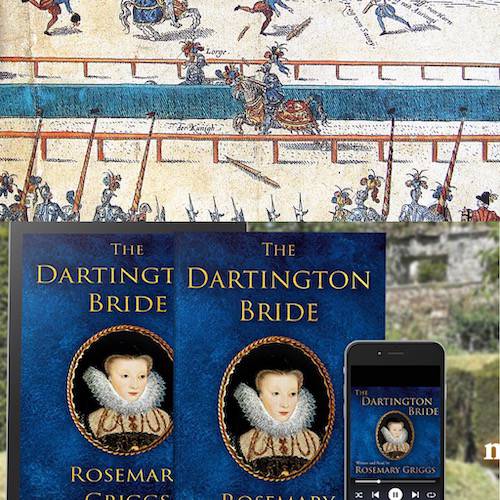
From the November 2024 issue of the Historical Novels Society Review
Nov. 2, 2024, 11:19 a.m. A review for 'The Dartington Bride', by HNR Issue 110 (November 2024)
... by the last, gripping chapters I was firmly rooting for her. All in all, Ms Griggs has delivered an enjoyable read.
The Dartington Bride (Daughters of Devon)
WRITTEN BY ROSEMARY GRIGGS
REVIEW BY ANNA BELFRAGE
In 1559, the French king, Henri II, died of injuries incurred during a tournament. The person responsible for these injuries was Gabriel de Lorges, the future Count of Montgomery. At the time, the protagonist of The Dartington Bride, Gabriel’s daughter Roberda, was around six. For some weeks, her existence went topsy-turvy as the family awaited news as to her father’s fate.
Roberda’s childhood is filled with turmoil: while her father was pardoned for Henri II, he then embraces the cause of Protestantism, which effectively has his entire family exposed to the dark and bloody underbelly of war. Despite all this unrest, Roberda’s parents manage to arrange good marriages for their children—marriages that would also benefit their cause. Roberda is to wed Gawen Champernowne, son of the Vice Admiral of the Fleet to the West and heir to the Dartington estate in Devon.
The Roberda-Gawen union is mostly a bed of thorns. Gawen dislikes Roberda on sight and resents being forced to wed her. Ultimately, this will lead to personal disaster, but how and why I leave for future readers to discover for themselves.
Ms Griggs manages her cast skilfully. Other than Roberda, her family members play central roles, as do real-life historical figures like Queen Elizabeth, Anne Cecil, and Walter Raleigh. It is evident Ms Griggs has not only done her research but is also invested in her protagonists. Initially, I found it hard to relate to Roberda. The child was surprisingly impolite and disrespectful of her elders – not a behaviour I would have thought was tolerated in the 16th century. But as the story progressed, she grew on me, and by the last, gripping chapters I was firmly rooting for her. All in all, Ms Griggs has delivered an enjoyable read.
Find & buy on
Details
PUBLISHER
Troubador Publishing
PUBLISHED
2024
PERIOD
Tudor
CENTURY
16th Century
Review
APPEARED IN
HNR Issue 110 (November 2024)
REVIEW FORMAT
Paperback
PAGE COUNT
288